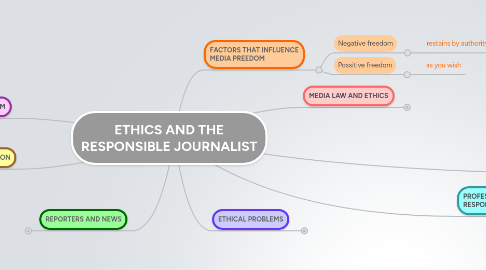
1. EXPERT OPINION
1.1. Johan Rotief
1.1.1. Be truthful
1.1.2. Be fain
1.1.3. Be duly impartial
1.1.4. Protect sources
1.1.5. Be free of group interests
1.1.6. Respect privacity
1.1.7. Not intrude into private
1.2. Franz Krüger
1.2.1. Unethical journalism
1.2.1.1. harms profession
1.2.1.2. democrazy itself
1.2.2. Hand not to choose sides
1.2.2.1. influence
1.2.2.2. political power
2. REPORTERS AND NEWS
2.1. Reporters observing the news
2.1.1. Plagiarism
2.1.1.1. copyright regulations
2.1.1.2. arrangement between journalists
2.1.2. With holding information
2.1.2.1. respect the law
2.1.2.2. not divulging information
2.1.3. Discrimination
2.1.4. Computer-assisted reporting
2.1.4.1. not coloquial source
2.2. Ethical news writing
2.2.1. Inaccuracy
2.2.1.1. no pay attention to details
2.2.2. Unfairness
2.2.2.1. no all the point of views
2.2.3. Painting a false positive picture
2.2.3.1. different views
2.2.4. Treating your subject fairly
2.2.4.1. no make fun
2.2.5. Interpretative reporting
2.2.5.1. reporter pint of view
2.2.5.2. no fair
2.2.6. Obscenity
2.2.6.1. indecent word
2.2.6.2. new: no offend people
2.3. Defining key concepts of ethics
2.3.1. Responsible journalism
2.3.1.1. concious of ethical problems
2.3.1.2. reports ability of the effects
2.3.2. Morality
2.3.2.1. principles
2.3.2.1.1. direction to actions
2.3.2.1.2. write or wrong actions
2.3.2.2. values
2.3.2.2.1. moral or non-moral
2.3.2.2.2. in line with society’s expectation
2.3.3. Classical theories of ethics
2.3.3.1. descriptive/meta-ethics
2.3.3.2. teological
2.3.3.2.1. consequence of an action
2.3.3.3. deontological
2.3.3.3.1. outcome of actions
2.3.3.4. virtue
2.3.3.4.1. right decisions
2.3.3.5. normative/applied
2.3.3.5.1. duties which guide human actions
2.4. African perspective of ethics
2.4.1. ethical bad behaviours
2.4.1.1. generated by self-will
2.4.1.2. brought about the influence of bad person
2.5. Guidelines for making ethical decisions
2.5.1. trust and fully
2.5.2. act independently
2.5.2.1. recognize good decisions
2.5.3. minimize harm
2.5.3.1. compassionate
3. REPONSIBLE PHOTOJOURNALISM
3.1. Manipulation of photographs
3.1.1. Ethic problem
3.1.2. Technology make easy
3.1.3. What for?
3.1.3.1. give more impact/clear
3.1.3.2. scenes you couldn’t capture
3.1.3.3. inaceptable
3.2. Setting up photographs
3.2.1. reality = can’t intruse
3.3. Privance
3.3.1. Private
3.3.1.1. own privacity/freedom
3.3.2. Public
3.3.2.1. can be recorded
3.3.3. Paparazzi change privacity concept
3.4. Injury, death and dying
3.4.1. Ethic
3.4.1.1. empathy
3.4.1.2. truth
3.4.1.3. humanity
3.4.1.4. integrity
3.4.1.5. candiness
3.4.2. Decide what is appropiate
4. MEDIA LAW AND ETHICS
4.1. Free press
4.1.1. law regulates
4.2. Ethic
4.2.1. Difference between good and bad
4.3. Morality
4.3.1. people behaviour
5. FACTORS THAT INFLUENCE MEDIA PREEDOM
5.1. Negative freedom
5.1.1. restains by authority/external forces
5.2. Possitive freedom
5.2.1. as you wish
6. ETHICAL PROBLEMS
6.1. New gathered
6.1.1. Information from witnessed
6.1.2. Event yourself
6.1.3. Information from other sources
6.2. Protect their sources
6.2.1. Keeping sources confidential
6.2.2. Fromulas impossible to identify
6.2.3. No emotionally attached
6.2.4. No invading the privacity
6.2.4.1. Privacity checklist
6.2.4.1.1. importance
6.2.4.1.2. Protection of people involve
6.2.4.1.3. Put in their place
6.2.4.1.4. How I know the story
6.2.4.1.5. Minimize the privacity
6.2.4.1.6. More perspective
6.2.4.1.7. Focuss on the opposite
6.2.4.1.8. Justify
6.3. Cultivate sources
6.3.1. Sure of your information
6.3.2. Correct the mistakes
7. PROFESSIONALISM AND RESPONSABILITY
7.1. Licensing to ensure
7.2. Non-profit media
7.2.1. rely donations
7.3. Public media
7.3.1. wide range of audience
7.4. Private media
7.4.1. own and controlled global conglomerates
8. MEDIA REGULATIONS
8.1. South Africa
8.1.1. Specific law to reveal their sources
8.1.2. neutral parties
8.1.3. goverment control media
8.1.4. own ethical codes of institutions
